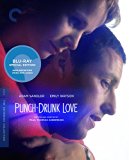| Reviews & Columns |
|
Reviews DVD TV on DVD Blu-ray 4K UHD International DVDs In Theaters Reviews by Studio Video Games Features Collector Series DVDs Easter Egg Database Interviews DVD Talk Radio Feature Articles Columns Anime Talk DVD Savant Horror DVDs The M.O.D. Squad Art House HD Talk Silent DVD
|
DVD Talk Forum |
|
|
| Resources |
|
DVD Price Search Customer Service #'s RCE Info Links |
|
Columns
|
|
|
Punch-Drunk Love
PTA provides proof of Sandler's possibly squandered promise
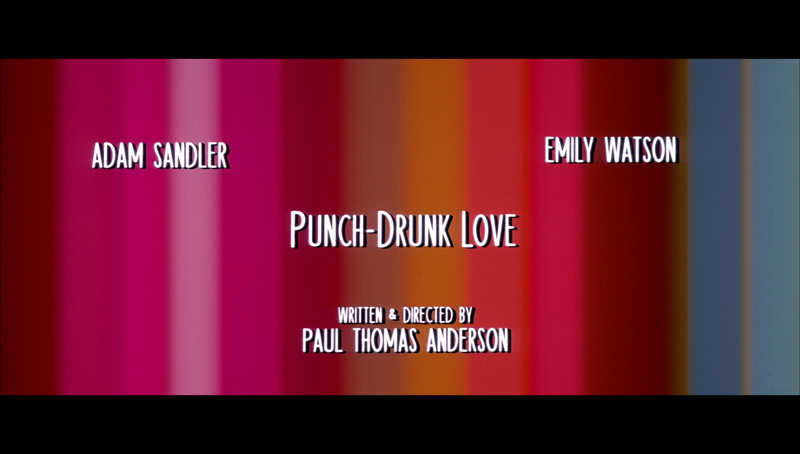
Loves: The Criterion Collection, Paul Thomas Anderson
Likes: early Adam Sandler
Dislikes: Sadness, rage
Hates: That Anderson doesn't do extras
The Movie
Writer/director Paul Thomas Anderson's Punch-Drunk Love opens with one heck of a bang. Well, actually, it opens with mostly silence, but soon thereafter there's a bang. Then some randomness. Then a big old truck. And from there, it settles into an interesting groove that, in some ways, follows that initial rhythm as we meet and get to know Barry (Adam Sandler), a small-business owner (what he sells is amusing, but unimportant), who has some personal problems. He's harassed constantly by his seven sisters (including Mary Lynn Rajskub), he struggles with rage and, most disruptive of all, he's utterly lonely. When he finds a broken harmonium--a small piano-like instrument that makes a unique sound via air bellows--dropped off outside his warehouse, it becomes an object of curiosity, eventually a security blanket of sorts (as its tones soothe the savage beast) and, with help, a symbol of possibilities.
That help comes in the form of Lena (Emily Watson), a woman who arrives in Barry's life just as randomly as the harmonium, and becomes the focus of his affection. Their courtship will not be an easy one however, as Barry struggles to connect, fearful that his foibles, particularly his rage--which materializes in striking fits of violence--will drive her away. That he seems wholly unequipped to have a proper relationship with anyone, be it his harridan sisters, his employees (including Luis Guzman) or Lena (portrayed with a near-angelic grace by Watson), doesn't help. If not for his anxieties and quirks, Barry would probably be a catch, but he doesn't make himself very desireable with behaviors that today would earn him a label placing him "on the spectrum."
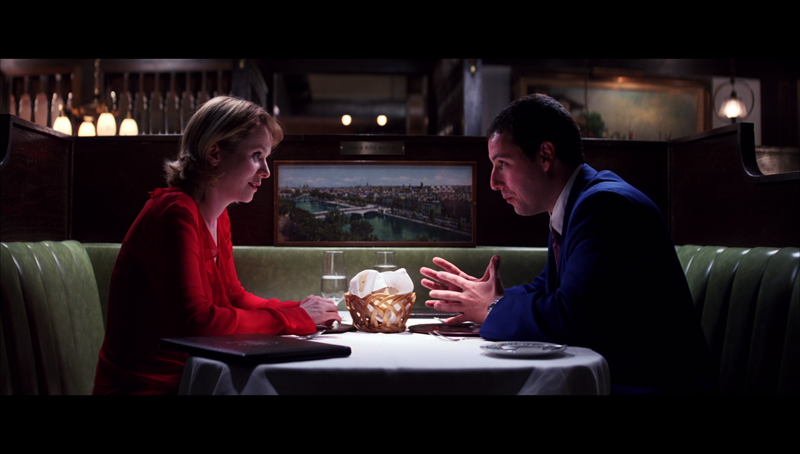
While Lena is fascinating in her mystery--her motivations and interests are mostly unclear or, at least, hard to comprehend--this is truly Barry's movie, and Sandler was a perfect choice. His best characters have always been built around a core of a coiled spring, but it usually expressed itself in goofy shouting or childlike frustration, as seen with his roles as Billy Madison and Happy Gilmore. With Barry, there's genuine anger, an uncontrolled force that explodes suddenly. It's Sandler at his most primal and emotional, and it's a wonder to behold, as it reveals what an actor he can (or at least could) be. A scene he shares with Hoffman that speaks to the film's core theme is simply fantastic, the kind of performance that earns awards and should have been a launching pad for a serious acting career (possibly short-circuited by audience reaction to films like Spanglish and Reign Over Me.)
As interesting as the film is throughout, it's no stretch to say that there's a swath of the audience that just won't dig this film (not unlike much of Anderson's canon.) As a writer and director who applies a very specific artistry to his films, he is not going to be everyone's cup of tea, and Punch-Drunk Love displays his tendencies from the start, with inexplanable phenomena being served front and center, asking you to buy in without any real incentive to do so. It's also very Anderson of him to utilize songs out of context (as he does perfectly with a tune from Robert Altman's Popeye) or have characters explicitly express their inner feelings, but if you can excuse him his artistic excesses, the sense of heightened reality, as well as the awkward romance, what he creates is worth his flights of fancy.
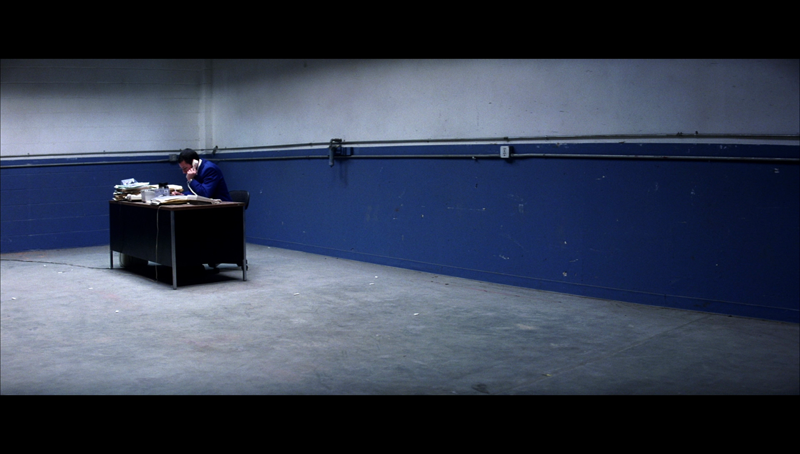
The Disc
Punch-Drunk Love (spine number 843) arrives on one Blu-ray disc in a clear keepcase with an insert and a double-sided cover featuring memorable images from the film. The classic (and silent) Criterion menu gives the choice to watch the film, navigate the timeline, select scenes and check out the special features. There are no audio options but English SDH subtitles are available.
The Quality
The 1080p, AVC-encoded 2.39:1 transfer was created, under Anderson's supervision, from a 35mm interpositive. The resulting image is gorgeous. Specific hues are pushed to the brink of being aggressive, without tipping over the edge, resulting in a Technicoloresque beauty, that's offset by a world that's inarguably dull and dim around them. The look of the film is so specific, with prismatic effects and washouts in some spots and deep, dark shadows in others, and this presentation makes it all look great, with excellent fine detail consistently present. There were no noticeable issues with digital distractions.
Sound is such an integral part of this film, from the dialogue to the music to the effects, and the DTS-HD Master Audio 5.1 track is just a pleasure to listen to. With the exception of a few key moments of silence, from the stunning first sequence through to the final moments, you're constantly in the middle of waves of audio, which maintain enough separation to be understood, yet work together like an orchestra to create an enveloping soundfield. The music is rich, dialogue is crisp (when appropriate) and sound effects are heavy when they should be, with bass that's present as needed, to create just the right feel for the film. It would be difficult to imagine how this could be improved.
Unfortunately, Anderson's viewing instructions in regards to picture settings and volume, which were a part of the original Superbit package, were not included with this release, so we are on our own to determine if this new release doesn't require his guidance.
The Extras
For his first three feature films, Anderson provided excellent supplemental material, with delightfully informative commentaries on the first two, and a candid making-of documentary on Magnolia. Since then, the pickings have been slim, with Anderson being intentionally absent from the supplements, letting the work as speak for itself.
Criterion has collected a handful of new extras though, including an interview with composer Jon Brion (27:19). The musician talks about the process of collaborating with Anderson, gives details on the harmonium in the film and its role, and discusses how his score interacted with visuals like the art in the movie. It's hard to miss how important the sound is to Punch-Drunk Love, but this chat might give you a new appreciation. Clips from the film and still photos of Anderson at work on the movie illustrate Brion's production stories. Footage of an orchestral recording session at Abbey Road in 2001 (9:56) provides an opportunity to watch Brion at work with his "instrument", including some of the more unique elements.
In recognition of the influence of Jeremy Blake's artwork on the film, art-world experts Lia Gangitano and Michael Conner have a conversation that lets them their thoughts on the late artist (20:25), his work and the themes and techniques he explored. His connection to this movie is almost a minor element, as the duo journey through his career and his connection to cinema, which started long before Punch-Drunk Love.
Punch-Drunk Love had a successful time at the 2002 Cannes Film Festival, with the film getting a nomination for the top prize and Anderson being named best director. This disc has 7:02 of a slightly chaotic group interview with Sandler, Hoffman, Watson and Anderson, conducted by a French host (via an interpreter). Anderson doesn't reveal a great deal beyond what is generally known about the movie, in what feels like a somewhat awkward situation. It's followed by a Cannes press conference (conducted by cineaste Henri Behar) with Anderson, Sandler, Watson, Hoffman and Jo-Anne Sellar, which touches on a range of topics, including Sandler's fit in Anderson's films, the American nature of the title, phone sex and improvisation in the production, As far as actual information, it's a bit light, as the group is either being coy, silly or evasive (with the exceptions of Hoffman and Sellar), but there are a few nuggets of insight to be found (including talk of a long-since-abandoned Sandler collaboration with Zhang Ziyi.)
Though the Healthy Choice air miles promotion is a relatively small element of the film, you can meet the real-life inspiration with a 2000 NBC interview (5:04) with Katie Couric and David Phillips, the man who discovered the flaw in the company's plan. Aside from how different the man is from Barry, you're not going to learn a great deal more about the story in this brief, surface-level segment.
THe rest of the extras are carried over from the previous Superbit DVD, starting with "Blossoms and Blood" (12:02), which is sort of like a compressed version of the film, with some material not seen in the film, blended with music from Jon Brion and the film's signature art. The feel is very familiar to those who have watched the film, but unique to itself at the same time.
Scopitones, clips of the colorful art by Jeremy Blake seen in the film mixed With scenes and music, are presented in 12 entries or in a play-all option that runs 6:06. Though intriguing little bursts of sight and sound, there's not enough meat to encourage multiple viewings.
The "Mattress Man Commercial" (:52) is a quick lo-fi ad for the store in the film, and it gets me every time. I can't figure out if what happens is real or not, but it's something to watch.
There are two deleted scenes to check out, one featuring Barry talking on the phone with his sisters (7:18) and one with Barry in an uncomfortable situation (2:23). The sister one is pretty great at showing Barry's mindset (and has bonus Paul F Tompkins) but was far too long to be in the movie. The other offers good Sandler, but doesn't work in its entirety.
A 2:42 slideshow of Blake artwork, set to the old-school "I've Gone Native Now" (credited to Annie Kerr) gives you another chance to appreciate the artist's contributions to the film. Also available are a trio of trailers: the wonderfully-fascinating theatrical trailer (2:33), the far-more conceptual "Jeremy Blake's Love" (1:24) and "Eat Tomorrow" (:34), a brief, nonsensical French promo.
In the package is a 10-panel fold-out, holding details on the film and disc, as well as a brief essay by filmmaker Miranda July, in which she attempts to put into words the things all fans of the film feel.
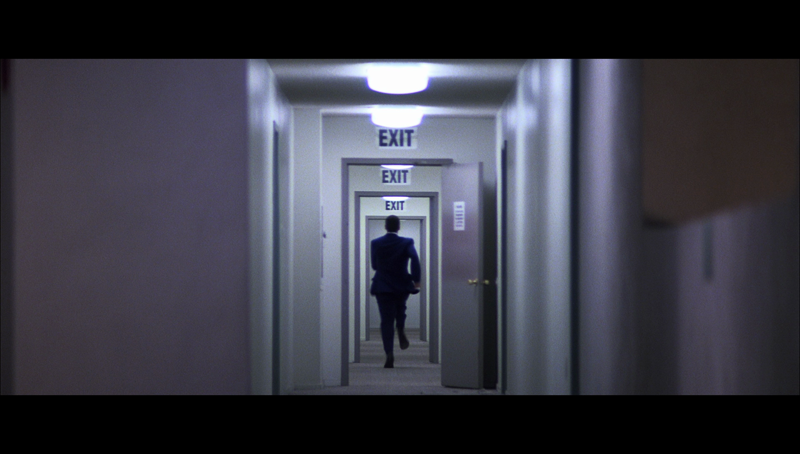
The Bottom Line
Punch-Drunk Love will never climb to the top of my personal list of favorite Paul Thomas Anderson films, but the third spot is a solid place to be. It's a scrappy little oft-misunderstood collection of visuals, sounds and emotion that coalesces into something touching and oddly romantic--somewhat of a companion piece to Fight Club in exploring what it is to feel without having the necessary coping mechanisms to deal with the effects. This release by Criterion looks and sounds excellent (a key for a film so driven by aesthetics) and the extras, though disappointingly (and expectedly) thin on PTA participation, do add some new material and offer some insight into the making of the film. Though certainly not a film for everyone, Punch-Drunk Love should however be seen by everyone, because whether you're an Anderson fan, a Sandler fan or both, there's a chance you'll see something in it you like.
Francis Rizzo III is a native Long Islander, where he works in academia. In his spare time, he enjoys watching hockey, writing and spending time with his wife, daughter and puppy.Follow him on Twitter
*The Reviewer's Bias section is an attempt to help readers use the review to its best effect. By knowing where the reviewer's biases lie on the film's subject matter, one can read the review with the right mindset.
|
| Popular Reviews |
| Sponsored Links |
|
|
| Sponsored Links |
|
|
| Release List | Reviews | Shop | Newsletter | Forum | DVD Giveaways | Blu-Ray | Advertise |
|
Copyright 2024 DVDTalk.com All Rights Reserved. Legal Info, Privacy Policy, Terms of Use,
Manage Preferences,
Your Privacy Choices | |||||||









